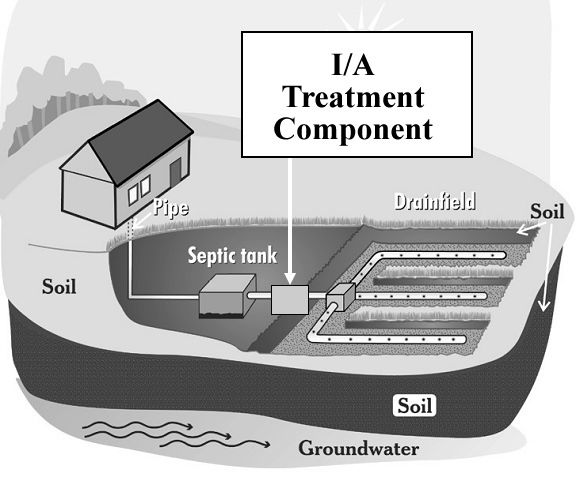

The Massachusetts Department of Environmental Protection (DEP) is responsible for ensuring clean water and the preservation of wetlands and coastal resources throughout the state. Title 5 regulations of the State Environmental Code provide for protection of our drinking water supplies, groundwater, wildlife habitat, and surface water bodies by requiring the proper siting, construction, and maintenance of all on-site wastewater treatment and disposal systems.
Here on Cape Cod — where most towns do not have municipal sewer systems — homeowners and businesses must install individual on-site septic disposal systems that meet these Title 5 standards. And now, with recent advances in the design and use of innovative technology-based solutions to wastewater treatment and disposal, more choices are available to home and business owners alike.
A “conventional” septic system has four main components: a pipe from the house or building, a septic tank, a leach field, and the surrounding soil. An Innovative/Alternative wastewater treatment system includes one important additional component that provides further treatment of the wastewater before it is discharged into the leach field.
This component is a treatment unit that combines chemical and biological processes to remove certain wastewater contaminants, and to convert others to less harmful forms. There are many treatment technologies that Coastal Engineering Co. specifies and operates, including Bioclere, Fast, SeptiTech, Recirculating Sand Filters, Perc-Rite, OMNI, Amphidrome, Waterloo.

Site limitations— including lot size and shape, proximity to wetlands or nitrogen-sensitive receptors, or depth to groundwater— can restrict where a conventional Title 5 septic system can be installed. In such instances, installation of an I/A system may be mandated by local Board of Health regulations for the project to be approved.
In addition, an I/A system may be mandatory if a cesspool or an existing septic system has failed and cannot be replaced with a conventional septic system that meets state and local standards. And, because an I/A system’s advanced treatment reduces wastewater’s nitrogen content, these systems may be required for some new site construction; additions to existing homes orbusinesses; near public watersheds; or in other nitrogen-sensitive areas.
Although there are a number of different I/A system technologies, all systems include a “biological” process that uses naturally occurring bacteria to break down and reduce the concentration of wastewater components. This process reduces the wastewater’s nitrogen content, converting waste substances to a form less damaging to the environment. For this reason, I/A systems have the potential to deliver improved, more cost-effective environmental results — of paramount importance in an environmentally-sensitive region like Cape Cod.
I/A system technologies go through a rigorous period of testing, performance evaluation, and review before they are approved by the Massachusetts DEP for general use. In addition, before an I/A system can be installed on a specific site, the local Board of Health must review and approve the site design plans.
Please contact us with any questions you might have about Innovative/Alternative (I/A) system installations! We would be happy to help you navigate the process!